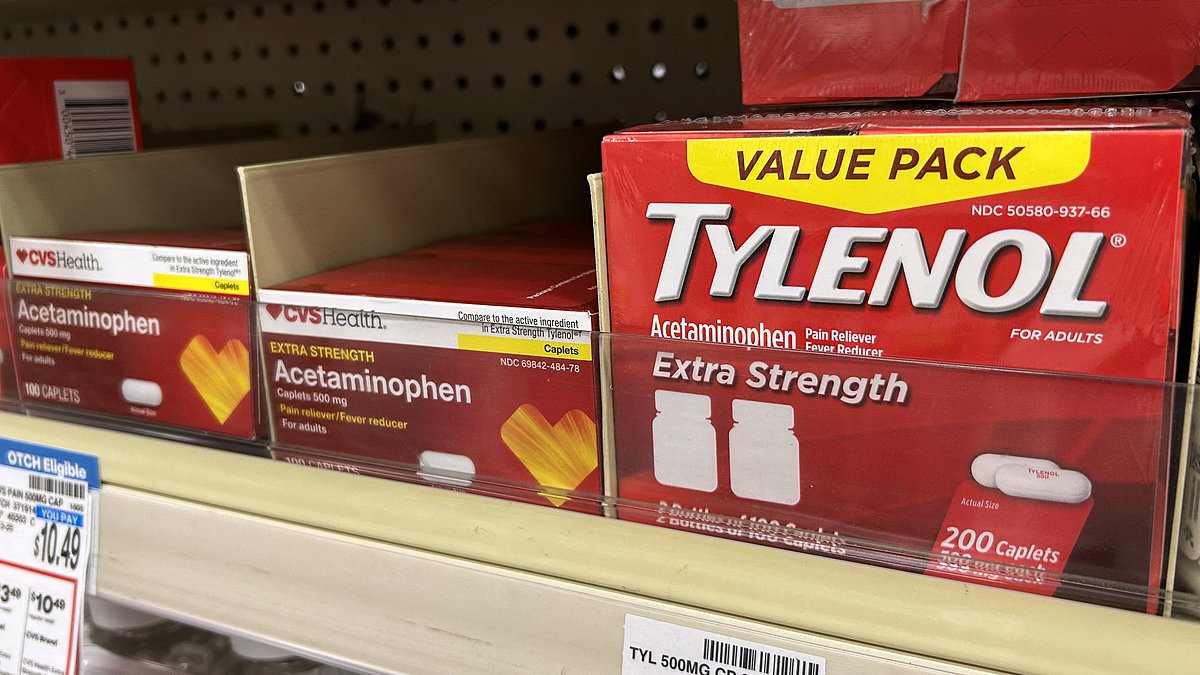Trump’s comments ‘to cost Tylenol $100M’ as firm blighted by murder scandal battles to save its reputation
By Editor,Wilko Martinez-Cachero
Copyright dailymail

Donald Trump’s repeated urges for Americans to not take Tylenol after he linked it to autism could plunge its manufacturer into its worst public relations crisis since the 1980s.
Eric Schiffer, a crisis PR expert, told the Daily Mail that Trump’s comments could cost Tylenol up to $100million this year.
He said: ‘With Trump attacking, it is like having your brand dragged across asphalt from the moving car.’
Schiffer expects ‘scared checkout baskets’ for 6-12 months as Tylenol takes ‘body blows from hell’.
‘I think you’ll see a bleed, a checkout with new parents, and then the lawsuits will have additional massive incoming missiles,’ he said.
Schiffer, the CEO of Reputation Management Consultants, added that he would advise Tylenol to ‘lead with clinicians, not marketers’.
He would feature pediatric physicians ‘doing the work’ on social media platforms frequented by young mothers-to-be to ‘counter message’ the negative connotations with Tylenol after the president’s comments.
Schiffer said: ‘I’d make sure the data is clear, and I would get their facts out via the pediatrics and OB-GYNs. I’d be deploying OB ambassadors on TikTok and YouTube shorts, and tackle anxiety where it breathes.’
A $50million-$100million hit is expected to be taken by the company this year, Schiffer predicted, but he does not believe Tylenol to be going through a ‘Bud Light moment’.
Noa Gafni, faculty at Columbia and New York University, also told the Daily Mail that Tylenol would suffer ‘significant’ consequences following Trump’s remarks.
She said: ‘I’m sure this will impact Tylenol financially, not just in the short term, but potentially in the long term, and the reason for that is because it got caught in the culture wars.’
Gafni also pointed to the Bud Light boycott, in which conservatives stopped buying the beer after the brand collaborated on an ad campaign with transgender influencer Dylan Mulvaney.
The world’s largest brewer saw a $1.4billion drop in sales and still has not recovered – which would be the worst case scenario for Tylenol.
Brands have a ‘really hard time recovering’ from political firestorms, Gafni said.
She added: ‘Once you have the US President telling you that your product is unsafe for a large swath of the population, and that it can have serious, serious consequences – even if it’s not true, it makes people doubt the claims of the brand.
‘Once you have that loss of brand reputation, whether it’s warranted or not, it can lead to significant long term consequences.’
The last time Americans boycotted Tylenol was in 1982, after seven Chicago residents died after taking contaminated capsules in an evil poisoning plot.
On Monday, the US president announced at the White House that taking Tylenol during pregnancy ‘can be associated with a very increased risk of autism’.
Trump stressed multiple times: ‘Don’t take Tylenol.’
He also instructed pregnant women to ‘tough it out’ and avoid taking the medication when they’re sick.
Tylenol is known as acetaminophen in the US and paracetamol around the world.
In April, the Centers for Disease Control and Prevention said that autism prevalence in the US had increased from one in 36 children to one in 31.
US Health and Human Services Secretary Robert F. Kennedy, Jr. previously said that the ‘autism epidemic’ was ‘running rampant’.
Tylenol is currently made by Kenvue, which was spun off from Johnson & Johnson in 2023.
Kenvue told the Daily Mail: ‘We believe independent, sound science clearly shows that taking acetaminophen does not cause autism. We strongly disagree with any suggestion otherwise and are deeply concerned about the health risks and confusion this poses for expecting mothers and parents.
‘Acetaminophen is the safest pain reliever option for pregnant women as needed throughout their entire pregnancy.
‘Without it, women face dangerous choices: suffer through conditions like fever that are potentially harmful to both mom and baby or use riskier alternatives. High fevers and pain are widely recognized as potential risks to a pregnancy if left untreated.’
The company added: ‘The facts are that over a decade of rigorous research, endorsed by leading medical professionals and global health regulators, confirms there is no credible evidence linking acetaminophen to autism.
‘We stand with the many public health and medical professionals who have reviewed this science and agree.’
On Wednesday, the White House’s X account reposted a March 7, 2017 post from Tylenol that read: ‘We actually don’t recommend using any of our products while pregnant. Thank you for taking the time to voice your concerns today.’
The White House’s comment was accompanied by a photo of Trump showing off a ‘TRUMP WAS RIGHT ABOUT EVERYTHING’ baseball cap, which the US leader recently also mentioned to the United Nations General Assembly.
Kenvue said about the post: ‘This eight-year-old consumer response is incomplete and did not address our full guidance on the safe use of Tylenol which has not changed.’
The company added that it recommended pregnant women to not take any over-the-counter medication – including acetaminophen – without talking to their doctor first.
In 1982, the poisoning of seven Chicagoans using Tylenol terrified Americans and sparked universal reforms regarding how over-the-counter drugs are packaged.
That happened when a still-unknown killer laced multiple extra-strength Tylenol pills by replacing some of the acetaminophen with potassium cyanide.
Today marks the 43rd anniversary of the first death from the Tylenol murders. The first victim was Mary Kellerman, 12, whose parents had given her an extra-strength Tylenol on September 28, 1982, after she complained of a sore throat and a runny nose.
She was dead by the following morning – and others quickly followed.
On that same day, postal worker Adam Janus, 27, was also killed via a tweaked Tylenol pill.
Janus’s death was initially credited to a heart attack – but it was actually due to cyanide poisoning.
After returning from the hospital, Adam’s brother Stanley, 25, and wife Theresa, 20, had a headache and took some Tylenol.
Stanley died three hours later and Theresa followed two days after.
Monica Janus, the daughter of Adam’s brother Joe, said to CBS News: ‘The amount of cyanide [Theresa] had in her would have killed 26 elephants.’
Mary McFarland, Paula Prince and Mary Weiner soon died from the deliberately-laced pills, as well.
It was not until early October that police realized that Tylenol linked all the deaths together.
The only suspect ever behind the poisonings was James W. Lewis, who died in 2023 at the age of 76.
Lewis served 13 years in prison in relation to the murders – but his sentence was for extortion.
No charges were brought against anyone with regards to the actual killings.
Lewis was considered a prime suspect but there was never enough concrete evidence.
He was sentenced to prison after writing a letter to Johnson & Johnson about how the poisonings theoretically happened.
The letter started: ‘Gentlemen: As you can see, it is easy to place cyanide (both potassium and sodium) into capsules sitting on store shelves. And since the cyanide is in the gelatin, it is easy to get buyers to swallow the bitter pill.
‘Another beauty is that cyanide operates quickly. It takes so very little, and there will be no time to take counter measures.’
Lewis wrote that he had ‘spent less than $50’ and that it took him ‘less than 10 minutes per bottle’ to carry out the plot.
He closed by demanding $1million and an eerie warning: ‘Don’t attempt to involve the FBI or local Chicago authorities with this letter.
‘A couple of phone calls by me will undo anything you can possibly do.’
Before his death, Lewis had provided authorities with DNA samples and fingerprints – but nothing came out of them.
Former assistant US attorney Jeremy Margolis, who prosecuted Lewis for extortion, said: ‘I was saddened to learn of James Lewis’s death. Not because he’s dead, but because he didn’t die in prison.’
Tylenol was the most popular painkiller of the time of the Tylenol murders, as well as Johnson & Johnson’s best-selling product.
One year before the Chicago murders, Tylenol made up 17 percent of the company’s net income, per The New York Times.
The drug controlled 37 percent of the total painkiller market. It dropped to 7 percent after the deaths.
It did not take long for Tylenol to bounce back.
Immediately, Johnson & Johnson recalled 31 million bottles of Tylenol, an effort that amounted to more than $100million at the time (nearly $336million in 2025).
A theory that the Tylenol pills had been contaminated in production was ruled out since the poisoned bottles came from different factories, making it likelier that one or multiple individuals went into Chicago-area stores to carry out the crime.
After the poisonings, Johnson & Johnson increased the safety around its packaging by introducing a new bottle with a triple safety seal.
That change was announced on November 12, 1982, less than two months after the first death.
By the end of the year, Johnson & Johnson’s stock had fully recovered – and Tylenol’s reputation was once again pristine.
In 1983, the US Congress successfully passed ‘the Tylenol bill’, making it a federal offense to tamper with consumer products.
However, the 1980s were ‘a completely different environment’ to today, Gafni said.
She added: ‘This wasn’t an issue of Tylenol itself as a product. There was a tampering issue, and so I think Tylenol was able to rebuild trust as a result of its engagement with the public.
‘Where I think this gets really tricky is Trump is able to make this statement because public sentiment around health has really, really, really shifted.’
Schiffer concluded: ‘This is not an existential threat to the survival of Tylenol in America.
‘The brand has lived through massive crises, including the 1982 cyanide debacle and they managed through it with transparency and smart rational systems.’



